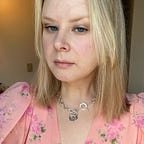July 1st marked my one-year anniversary of being diagnosed with endometriosis.
After struggling for years, I finally fought to get a laparoscopic excision surgery and find out what was really causing my pain, since my doctors at the time kept dismissing my complaints. They found endometriosis on my bladder, rectum, left ovary, right uterosacral ligament, and uterus.
I was terrified that they weren’t going to find anything. This is a common fear in the endometriosis community. I was mentally preparing to hear that they had found nothing during surgery and that I needed to try something else for pain relief.
Instead, my struggles were validated by a diagnosis that I had fought to get for years. Being diagnosed with a chronic pain condition helped me get the treatment I need, but it also changed how I think about disability and living in a world that belittles women’s pain.
As a PhD student in critical disability studies, my thoughts and philosophy of disability has drastically changed. I believe that chronic pain, particularly women’s chronic pain, is not discussed enough in the CDS world. Physical impairment — the material reality of the disabled body — cannot be ignored when discussing disability. I really did have endo lesions in my body. No amount of societal change would help the fact that I am in pain every day. To suggest that the majority of disability results from structural and social environments does a huge disservice to people living with chronic pain.
How CDS thinks about chronic pain and impairment has angered me greatly. I also believe that medical treatment of my endo — surgical removal, Botox, and physical therapy — has changed my life and gave me an opportunity to somewhat normally function in the world again. I wanted desperately to fix my uterus and recover from pain. While I do recognize that many disabled people, particularly in the Deaf and autism communities, do not agree with medical intervention, treatment gave me a second chance at life. I desperately wanted to be fixed. No one wants to live in pain.
Being diagnosed has also changed how I look at myself and my own body. Going through several surgeries has left multiple scars on my abdomen. I look at myself and see ten scars that mark where my lesions were. They are a constant reminder that I am validated and strong.
But it also reminds me that endo has permanently disfigured my body. Random men on the Internet have commented that my abdomen is “gross.” Women are not allowed to share vulnerable moments online without the harassment of men. I have stopped showing my abdomen to strangers because of this. Maybe this will change in the future.
Endo has also shown me that my womanhood is validated. I have never felt such a sisterhood with other women than I have with other women who have endo. Being in online support groups and message boards, discussing the reality of this illness, has brought me so many friendships with other women that I have never before experienced. I have never felt prouder to be a woman and feminist than I have in the endo community.
Most importantly, however, being diagnosed has taught me to fight for myself in a medical system that dismisses women at every turn. I am no longer afraid or intimidated by doctors and nurses. I allow myself to get angry at doctors and to recognize that I am a human being who deserves equal treatment. I am not afraid to call out unethical practices in medicine because a doctor is male or because I am a young woman.
Being an official “endo warrior” means to be fearless even when I can’t get out of bed because of pain. It means facing this illness head on and recognizing how strong I really am.
July 1st is now my official second birthday. While endo has caused me so much debilitating pain, it has taught me how much of a strong woman I really am.
